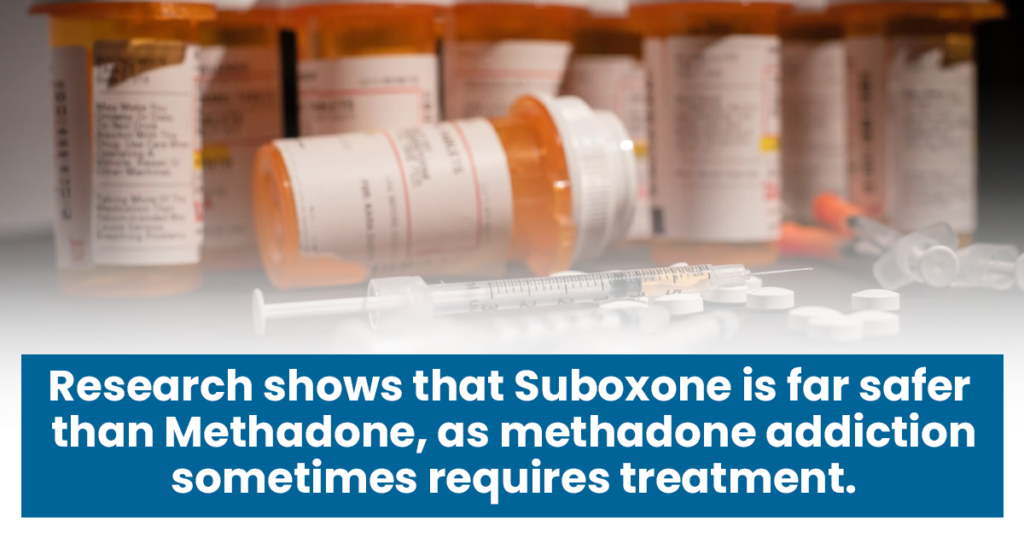
Suboxone and Methadone are often used to alleviate withdrawal symptoms and reduce cravings. When dealing with opioid use disorder OUD, a doctor may prescribe you one of these medications. A professional must prescribe these medications under careful supervision. These medications play a key role in the treatment of opioids addiction. There are differences of opinion in between which is more effective and drives results more swiftly.
The Purpose of Methadone in Recovery
Since the 1960s, Methadone has been an effective medication used to treat opioid addiction. Methadone similarly acts on the brain to opioid painkillers like morphine, oxycodone, and heroin. It activates receptors and changes how the brain interprets pain signals.
The combination of Methadone with other therapy services assists those dealing with addiction. Overcoming their dependence on opioids yields the best results. Methadone is only offered through methadone maintenance clinics and opioid treatment programs.
In those who have struggled with substance abuse, frequent Methadone can ease opioid withdrawal symptoms. It also lessens opioid cravings, promotes sobriety, and improves day-to-day functioning. Some risks are still involved with taking Methadone to help overcome their addiction. Even though Methadone has fewer side effects than other opioid agonists.
The Controlled Substances Act classifies Methadone as Schedule II because of its high potential for abuse. If Methadone is not meticulously under observation and used exactly as directed, it can be harmful. All patients in heroin or opiate addiction treatment risk overdosing on the drug. Due to its high street value, Methadone has historically been diverted for use outside of the context for which it was prescribed.
Is There a Risk of Overdosing on Methadone?
Yes. The most hazardous symptom is respiratory distress because the medicine can delay or stop your breathing. Breathing may become more complicated if alcohol is present while taking buprenorphine or Methadone. Research shows that Suboxone is far safer than Methadone, as methadone addiction sometimes requires treatment.
The following are other signs of an overdose of Methadone:
- Breathing too slowly
- Shallowly drowsy
- Hypotension,
- Lightheadedness and dizzy
- Clammy Skin
- Muscular Atrophy is the loss of muscle mass
Suboxone contains the Buprenorphine and Naloxone combination. It is helpful to treat opioid addiction. Many people have successfully ended their drug use by using this medication.
This is a drug that aids in the detoxification and withdrawal from opioids. It has been proven to be particularly effective when used alongside Naloxone.
Helpful in Opioid Detox
A combined opioid painkiller called Suboxone also contains Naloxone. Suboxone and Methadone are two different treatments for opioid dependency. The drug Suboxone contains both buprenorphine and Naloxone. An opioid partial agonist that reduces cravings and withdrawal symptoms is buprenorphine. The opioid antagonist naloxone includes lowering drug abuse.
Synthetic opioids like Methadone can reduce cravings and ease withdrawal symptoms. Suboxone and Methadone are both effective in relieving painful withdrawal symptoms in the initial phases of detox.
Both can be used as a permanent treatment that can daily.
Opioid maintenance enables people to go about their daily lives free from addiction. Both Methadone treatment and Suboxone are treatment options for substance use disorders. These can help you recuperate from an opioid overdose.
What Distinguishes Methadone from Suboxone?
Both are advantageous for opioid use disorders, although they function differently. These medications treat opioid dependence as they reduce the pain of withdrawal. Suboxone is less addictive than Methadone, although both drugs are easy to obtain. For some people, home treatment is related to treating opioid use disorder. Suboxone also sometimes becomes addictive and will require treatment.
Methadone is an opioid drug that, like oxycodone and heroin, binds to the brain’s opioid receptors as a full agonist. The euphoria experienced after ingesting Methadone is far less potent than consuming heroin.
Compared to full agonists, Suboxone is a partial opioid agonist that binds to opioid receptors less strongly. It has less powerful opioid actions but the same aversion-suppressing qualities as Methadone.
Suboxone Is Commonly the Medication of Choice
Suboxone is the medication of choice for treating opioid use disorder since its users are less likely to abuse it. It has a naloxone blocker which makes it a safer option for patients.
If you are still having trouble with your addiction, Methadone is a better option. One can convert to Methadone if they cannot maintain sobriety while using Suboxone or if they choose a higher level of daily discipline.
Frequently Asked Questions
Is Suboxone better for you than Methadone?
These are both effective at treating opioid use disorder, and it has been found a low dose of Suboxone is much more effective than a higher dose of Methadone.
Is Methadone the same as Suboxone?
Suboxone is only used to treat dependence on opioids as it has an opioid blocker, too, while Methadone is both for pain and opioid addiction treatment.
Can you replace Methadone with Suboxone?
It is feasible to switch from Methadone to buprenorphine/naloxone (Suboxone) as it will be carefully completed under coordination.
Haven Detox Provides Medication-Assisted Treatment
When you want to get treated for your opioid addiction, you can count on Haven Detox, as it offers premium medical detox to prepare each patient for an effective recovery process.
Our experienced medical team will work with patients to create customized plans tailored to their needs. An inpatient program at The Haven offers patients a safe and comfortable recovery environment with 24/7 access to medical care and various recreational amenities.
Feel free to call us and get more information about our admission process by dialing (561) 328-8627.